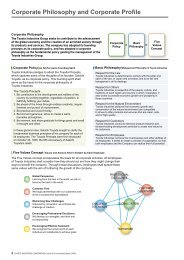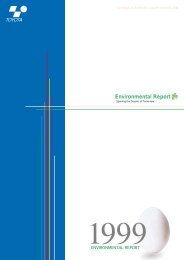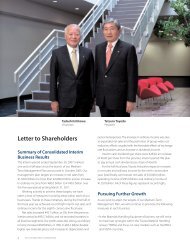Sustained Innovation and Creativity - Toyota Industries Corporation
Sustained Innovation and Creativity - Toyota Industries Corporation
Sustained Innovation and Creativity - Toyota Industries Corporation
You also want an ePaper? Increase the reach of your titles
YUMPU automatically turns print PDFs into web optimized ePapers that Google loves.
Reliance on Suppliers of Raw Materials <strong>and</strong>Components<strong>Toyota</strong> <strong>Industries</strong>’ products rely on various raw materials<strong>and</strong> components from suppliers outside the <strong>Toyota</strong><strong>Industries</strong> Group. <strong>Toyota</strong> <strong>Industries</strong> has concluded basicbusiness contracts with these external suppliers <strong>and</strong>assumes it can carry out stable transactions for rawmaterials <strong>and</strong> components. However, <strong>Toyota</strong> <strong>Industries</strong> hasno assurances against future shortages of raw materials<strong>and</strong> components, which arise from a global shortagedue to tight supply or an unforeseen accident involvinga supplier. Such shortages could have a negative effecton <strong>Toyota</strong> <strong>Industries</strong>’ product production <strong>and</strong> cause anincrease in costs, which could have an adverse impacton <strong>Toyota</strong> <strong>Industries</strong>’ fi nancial condition <strong>and</strong> businessresults.Environmental RegulationsIn view of its social responsibilities as a company,<strong>Toyota</strong> <strong>Industries</strong> strives to reduce any burden on theenvironment resulting from its production processes, aswell as strictly adheres to applicable environmentallaws <strong>and</strong> regulations. However, various environmentalregulations could also be revised <strong>and</strong> strengthenedin the future. Accordingly, any expenses necessary forcontinuous strict adherence to these environmentalregulations could result in increased business costs <strong>and</strong>have an adverse impact on <strong>Toyota</strong> <strong>Industries</strong>’ fi nancialcondition <strong>and</strong> business results.Alliances with Other CompaniesAiming to exp<strong>and</strong> its businesses, <strong>Toyota</strong> <strong>Industries</strong> engagesin joint activities with other companies through alliances<strong>and</strong> joint ventures. However, a wildly fl uctuating markettrend or a disagreement between <strong>Toyota</strong> <strong>Industries</strong> <strong>and</strong>its partners, owing to business, fi nancial or other reasons,could prevent <strong>Toyota</strong> <strong>Industries</strong> from deriving the intendedbenefi ts of its alliances.Exchange Rate Fluctuations<strong>Toyota</strong> <strong>Industries</strong>’ businesses encompass the production<strong>and</strong> sales of products <strong>and</strong> the provision of servicesworldwide. Generally, the strengthening of the yenagainst other currencies (especially against the U.S. dollar<strong>and</strong> the euro, which account for a signifi cant portionof <strong>Toyota</strong> <strong>Industries</strong>’ sales) has an adverse impact on<strong>Toyota</strong> <strong>Industries</strong>’ business, while a weakening of theyen has a favorable impact. An increase in the value ofcurrencies in countries or regions where <strong>Toyota</strong> <strong>Industries</strong>carries out production could lead to an increase in localproduction, procurement <strong>and</strong> distribution costs. Suchan increase in costs could reduce <strong>Toyota</strong> <strong>Industries</strong>’price competitiveness. Additionally, because exportsales of several businesses are denominated mainly inyen, exchange rate fl uctuations could have an adverseimpact on <strong>Toyota</strong> <strong>Industries</strong>’ fi nancial condition <strong>and</strong>business results due to a change in market prices.Share Price Fluctuations<strong>Toyota</strong> <strong>Industries</strong> holds marketable securities, <strong>and</strong>therefore bears the risk of price fl uctuation of theseshares. Based on fair market value of these shares atthe end of the fi scal year under review, <strong>Toyota</strong> <strong>Industries</strong>had unrealized gains. However, unrealized gains onmarketable securities could worsen depending on futureshare price movements. Additionally, a fall in share pricescould reduce the value of pension assets, leading to anincrease in the pension shortfall.Effects of Disasters, Power Blackouts <strong>and</strong>Other Incidents<strong>Toyota</strong> <strong>Industries</strong> carries out regular checks <strong>and</strong>inspections of its production facilities to minimize theeffect of production breakdown. However, there is noassurance <strong>Toyota</strong> <strong>Industries</strong> can completely preventor lessen the impact of man-made or natural disasters,including malfunctions of production facilities, fi res atproduction facilities <strong>and</strong> power blackouts. For example,the majority of <strong>Toyota</strong> <strong>Industries</strong>’ domestic productionfacilities <strong>and</strong> most of its business partners are situated inthe Chubu region. Therefore, a major earthquake suchas the Tokai Earthquake, or an incident that affects otheroperations, could delay or stop production or shipmentactivities. Such prolonged delays <strong>and</strong> stoppages couldhave an adverse impact on <strong>Toyota</strong> <strong>Industries</strong>’ fi nancialcondition <strong>and</strong> business results.Latent Risks Associated withInternational Activities<strong>Toyota</strong> <strong>Industries</strong> manufactures <strong>and</strong> sells products <strong>and</strong>provides services in various countries. Such unforeseenfactors as social chaos, including political disruptions,terrorism <strong>and</strong> wars, as well as changes in economicconditions, could have an adverse impact on <strong>Toyota</strong><strong>Industries</strong>’ fi nancial condition <strong>and</strong> business results.Retirement Benefi t Liabilities<strong>Toyota</strong> <strong>Industries</strong>’ employee retirement benefi t expenses<strong>and</strong> liabilities are calculated based on expected ratesof return on pension assets as well as assumptions uponmaking actuarial calculations that incorporate discountrates <strong>and</strong> other factors. Therefore, differences betweenactual results <strong>and</strong> assumptions as well as changes inthe assumptions could have a signifi cant impact onrecognized expenses <strong>and</strong> calculated liabilities in futureaccounting periods.72 <strong>Toyota</strong> <strong>Industries</strong> <strong>Corporation</strong> Annual Report 2006



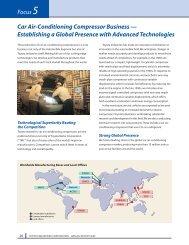
![PDF[476KB/5 pages] - Toyota Industries Corporation](https://img.yumpu.com/50288545/1/190x123/pdf476kb-5-pages-toyota-industries-corporation.jpg?quality=85)
![PDF[622KB/13pages] - Toyota Industries Corporation](https://img.yumpu.com/47399131/1/190x245/pdf622kb-13pages-toyota-industries-corporation.jpg?quality=85)
![PDF[792KB/2Pages] - Toyota Industries Corporation](https://img.yumpu.com/45510108/1/184x260/pdf792kb-2pages-toyota-industries-corporation.jpg?quality=85)
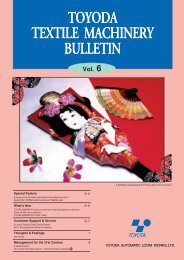

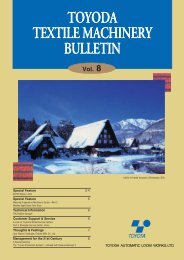
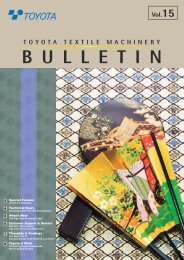
![PDF[126KB/4Pages] - Toyota Industries Corporation](https://img.yumpu.com/41525474/1/184x260/pdf126kb-4pages-toyota-industries-corporation.jpg?quality=85)
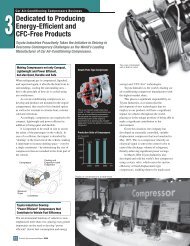
![PDF[1229KB/26 pages] - Toyota Industries Corporation](https://img.yumpu.com/40908773/1/190x247/pdf1229kb-26-pages-toyota-industries-corporation.jpg?quality=85)
